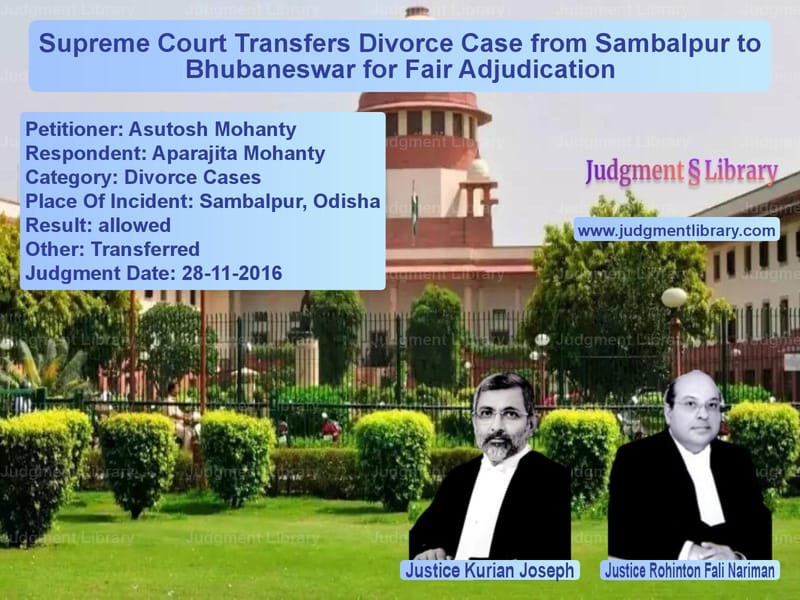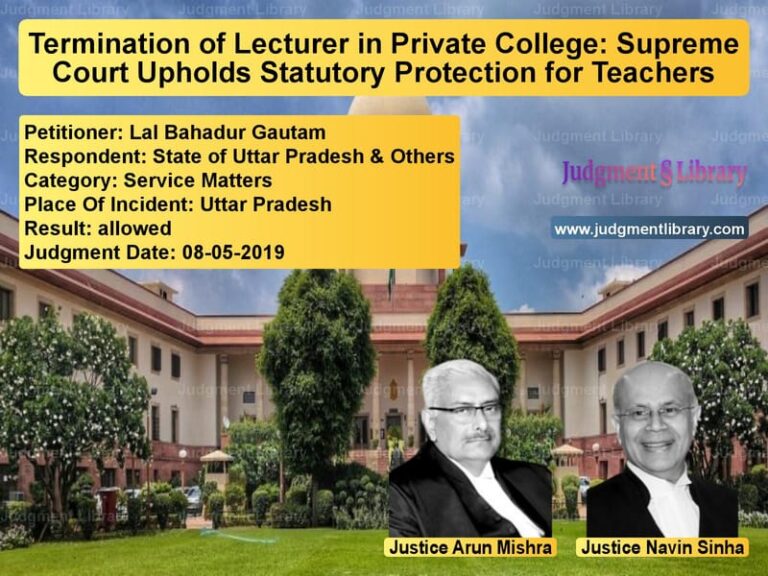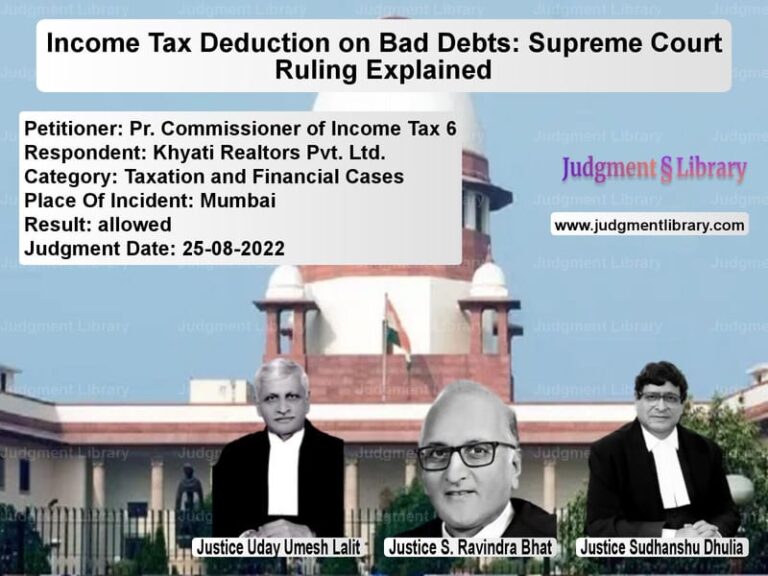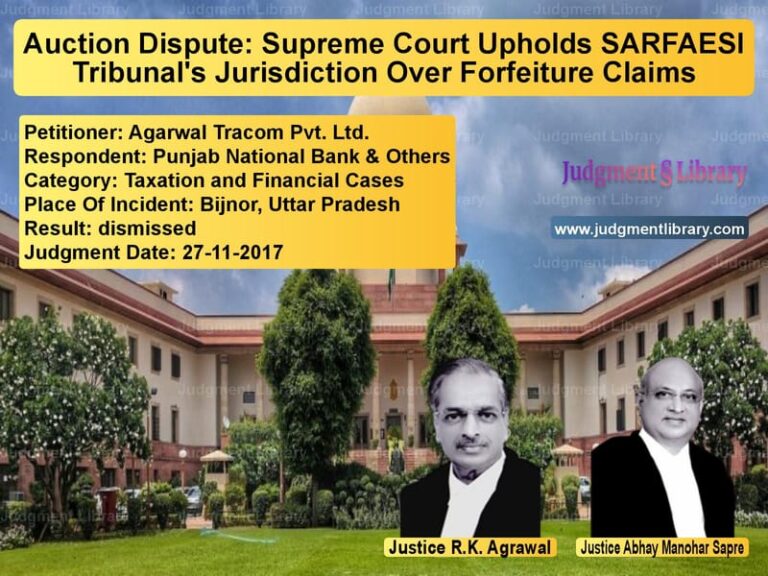Supreme Court Transfers Divorce Case from Sambalpur to Bhubaneswar for Fair Adjudication
The Supreme Court of India, in the case of Asutosh Mohanty vs. Aparajita Mohanty, ruled on a matrimonial dispute concerning the transfer of a divorce petition from the Family Court in Sambalpur to the Family Court in Bhubaneswar. The case involved the petitioner’s request to transfer his divorce case, citing logistical difficulties, fairness in adjudication, and ensuring both parties had equal access to the judicial process.
Background of the Case
The petitioner, Asutosh Mohanty, had filed an application for transferring Case No. 106 of 2015 from the Family Court in Sambalpur to the Family Court in Bhubaneswar. The case originated from marital disputes between the petitioner and the respondent, Aparajita Mohanty, and involved allegations of discord, separation, and irretrievable breakdown of the marriage.
The petitioner contended that:
- He was facing immense hardship in attending proceedings in Sambalpur.
- The respondent had moved to Bhubaneswar, making it difficult for both parties to attend proceedings in Sambalpur.
- The petitioner had genuine reasons to seek a transfer of the case to Bhubaneswar, where the respondent had already relocated.
- The Bhubaneswar Family Court had better judicial infrastructure and would ensure a fair hearing.
The High Court had dismissed the transfer petition, compelling the petitioner to approach the Supreme Court for relief.
Key Legal Issues
- Whether the petitioner’s plea for transferring the case was justified on grounds of inconvenience and fairness.
- Whether matrimonial cases should be heard in locations accessible to both parties.
- Whether the respondent’s consent to the transfer should weigh in favor of the petitioner’s request.
Arguments by the Petitioner
- The petitioner argued that he faced extreme hardship in attending the proceedings in Sambalpur, given his professional and personal commitments.
- He contended that the respondent had already shifted to Bhubaneswar and had no compelling reason to oppose the transfer.
- The petitioner emphasized that Bhubaneswar had a well-equipped Family Court capable of handling matrimonial disputes efficiently.
- He cited previous judgments where the Supreme Court had considered hardship and convenience in matrimonial transfer cases.
Arguments by the Respondent
- The respondent, Aparajita Mohanty, did not object to the transfer of the case.
- She conceded that shifting the case to Bhubaneswar would facilitate fair proceedings.
- The respondent supported the petitioner’s request, acknowledging that logistical convenience should be considered.
Supreme Court’s Judgment
A two-judge bench comprising Justice Kurian Joseph and Justice Rohinton Fali Nariman reviewed the arguments and granted the transfer request.
The Supreme Court held:
“We are of the view that it is in the interest of both the parties and it is fairly conceded also by the respondent that the matter be heard at Bhubaneswar.”
The Court issued the following directives:
- Case No. 106 of 2015 shall be transferred from the Family Court in Sambalpur to the Family Court in Bhubaneswar.
- The parties shall appear before the Family Court in Bhubaneswar on January 13, 2017.
- The Registry was directed to communicate a copy of the judgment to both courts.
The appeal was disposed of without costs.
Key Takeaways from the Judgment
- Transfer of Matrimonial Cases: The ruling underscores the Court’s willingness to consider convenience and fairness in matrimonial disputes.
- Mutual Agreement Considered: The Court factored in the respondent’s agreement to the transfer while making its decision.
- Judicial Efficiency: The transfer ensures that proceedings take place in a court that is more accessible to both parties.
Impact of the Judgment
- Ease of Access to Justice: The ruling highlights the importance of ensuring that parties in matrimonial disputes can access courts without hardship.
- Fair Proceedings: Transferring the case to a mutually agreed venue ensures a fairer and more efficient resolution.
- Precedent for Similar Cases: The decision provides guidance on handling similar transfer requests in future matrimonial disputes.
Conclusion
The Supreme Court’s ruling in Asutosh Mohanty vs. Aparajita Mohanty ensures that divorce proceedings are conducted in a location that is convenient for both parties. By transferring the case from Sambalpur to Bhubaneswar, the Court upheld principles of accessibility, fairness, and judicial efficiency in matrimonial disputes.
This decision sets a precedent for future transfer cases, ensuring that courts take into account the practical difficulties faced by litigants. The Supreme Court reaffirmed that matrimonial disputes should be adjudicated in a manner that minimizes hardship for both parties, promoting a fair and just legal process.
Don’t miss out on the full details! Download the complete judgment in PDF format below and gain valuable insights instantly!
Download Judgment: Asutosh Mohanty vs Aparajita Mohanty Supreme Court of India Judgment Dated 28-11-2016.pdf
Direct Downlaod Judgment: Direct downlaod this Judgment
See all petitions in Mutual Consent Divorce
See all petitions in Property Division in Divorce Cases
See all petitions in Alimony and Maintenance
See all petitions in Judgment by Kurian Joseph
See all petitions in Judgment by Rohinton Fali Nariman
See all petitions in allowed
See all petitions in Transferred
See all petitions in supreme court of India judgments November 2016
See all petitions in 2016 judgments
See all posts in Divorce Cases Category
See all allowed petitions in Divorce Cases Category
See all Dismissed petitions in Divorce Cases Category
See all partially allowed petitions in Divorce Cases Category







